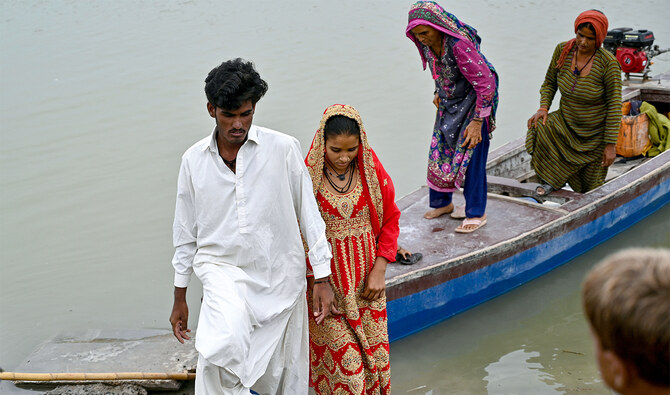KARACHI: The chief minister of Pakistan’s southern Sindh province has ordered an inquiry into dozens of child marriages in the Dadu district in the wake of deadly floods that hit the region two years ago, the Sindh CM’s office said on Sunday.
Pakistan’s high rate of marriages for underage girls had been inching lower in recent years, but after the unprecedented floods in 2022, rights workers warn such weddings are now on the rise due to climate-driven economic insecurity.
Many villages in the agricultural belt of Sindh have not recovered from the 2022 floods, which plunged a third of the country underwater, displaced millions and ruined harvests. Child marriages have particularly spiked in the Dadu district that for months resembled a lake, according to social activists. In Khan Mohammad Mallah village alone, 45 underage girls have become wives since the last monsoon — 15 of them in May and June this year.
Sindh CM Murad Ali Shah sought a report from the Hyderabad commissioner into these marriages in return for money given to families of the brides, inquiring about the social, financial and legal factors behind them.
“Form a committee for a detailed inquiry and furnish a report whether these girls hailed from flood-affected families,” Shah told the Hyderabad commission, according to the CM’s office.
“What is the condition of these married girls at present? Give a report from every aspect so that it can be resolved.”
Child marriages are common in parts of Pakistan, which has the sixth-highest number of girls married before the age of 18 in the world, according to government data published in December. The legal age for marriage varies from 16 to 18 in different regions, but the law is rarely enforced.
Parents of these young girls said they hurried the marriage of their daughters to save them from poverty, usually in exchange for money.
“Before the 2022 rains, there was no such need to get girls married so young in our area,” village elder Mai Hajjani, 65, told AFP this week. “They would work on the land, make rope for wooden beds, the men would be busy with fishing and agriculture. There was always work to be done.”
Pakistan is recognized as one of the most vulnerable countries to climate change effects in the world. The summer monsoon between July and September is vital for the livelihoods of millions of farmers and food security, but scientists say climate change is making them heavier and longer, raising the risk of landslides, floods and long-term crop damage.
In June, a senior UN official warned that an estimated 200,000 people in Pakistan could be affected by the upcoming monsoon season, which is expected to bring heavier rains than usual.
— With input from AFP
















